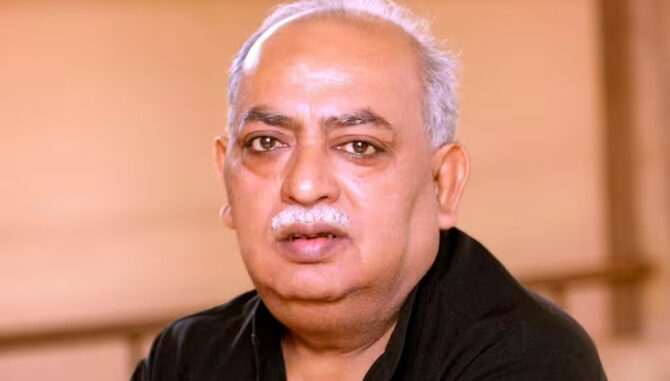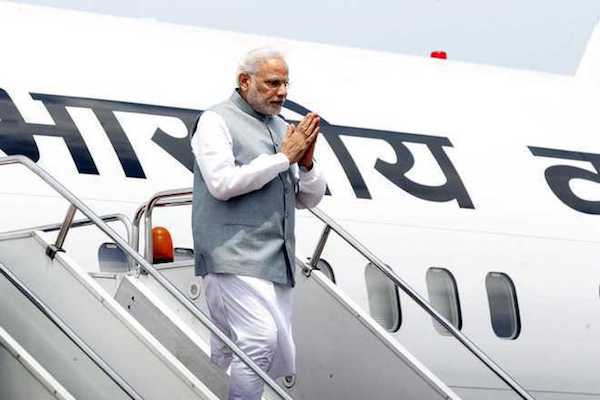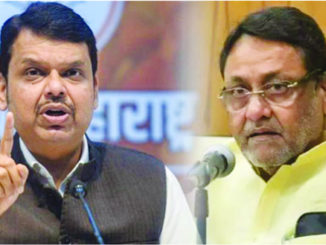

Munawwar Rana was born on 26th November 1952 to Aisha Khatoon and Anwar Rana at Rae Bareilly, Uttar Pradesh in India. He was the youngest among five siblings and was very close to his mother, this affection with his mother when put into the words became a prominent couplet of modern-day Urdu poetry:
Kisi Ko Ghar Mila Hissay Mein, Ya Koi Duka’n Aayi
Main Ghar Mein Sabse Chhota Tha, Mere Hissay Mein Maa’n Aayi
Munawwar Rana got his basic education at Rae Bareilly and Lucknow but when his father moved to Kolkata (the then Calcutta), he was called upon by his father to join him and pursue his further studies from higher secondary until graduation at Kolkata. Subsequently he got engaged with the family business by the name of Rana Transport, he took the success of the business to new heights with his efforts and untiring labor.He utilized his professional necessities to learn the realities of life and travelled all across the country on his trucks to have a closer look at common people of different cultures, he observed the harsh veracities and put his experiences into his writings. He mastered the art of empathizing the pain of real-life society, be it an elderly man selling newspaper, a female laborer at some petty workplace, a child brooming a train compartment or a tired homeless worker sleeping on
a pavement on a newspaper as his mattress and sheet were all his motivations to express his
thoughts. His keen observations produced some unparallel works that were never a part of Urdu
poetry in the past, he pulled in the feminine sentiments of a sister and a mother in his poetry and
rightly said:
Mamooli Ek Qalam Se Kahan Tak Ghaseet Laaye
Hum Is Ghazal Ko Kothay Se Maa’n Tak Ghaseet Laaye
The literary environment at Lucknow had a great impact on the personality of Munawwar Rana
that was polished under the mentorship of noted poet Wali Aasi but the initial credit goes to his
grand father Syed Sadiq Ali, who literally use to make him recite the works of other prominent
poets so that his interest is developed at an early stage and he gets the inspiration, this practice
surely paid back at a later stage.
Munawwar Rana’s poetry has the ability to touch the cords of a common man, his poetry
resounds the heartbeat of India, anyone who heard or read him was always touched by the
intensity of his works. He could feel and reflect the thoughts of love, struggle, poverty and
challenges etc. with equal ease as he was a very soft hearted and emotional person in real life.
One specific incident that took place in Pakistan shows his emotional side at length, he was to
recite at a Mushaira in border district of Ferozepur where he met the people who were separated
from their families and friends during the partition. His interaction with those people brought up
the sentiments of pain out of separation from their loved ones, their villages and their fields, this
interaction left a deep impact and gradually laid the foundation of his masterpiece ‘MuhajirNaama’. He penned the thoughts that were close to the hearts of a listeners and left an impression with the audience as if they were witnessing their own past in his writings. At times his emotions used to over-power his own self and he was very honest to cry on sensitive thoughts of petty things that were coming deep from his heart.
During this same visit, at a Mushaira in Karachi, he was approached by an organizer to attend
another event somewhere in Sindh but Munawwar Rana excused himself on health grounds and
expressed his regret for not being able to attend. The organizer took a commercial route and
offered him the royalty that was double of what he was likely to be paid in Karachi, this incident
hurt him deeply and he wrote few couplets on the spot that he recited on his turn, right in front
of the crowd and dedicated to that organizer. These lines later on became the flagship part of
Muhajir-Naama:
Muhajir Hain Magar Hum Ek Duniya Chhor Aaye Hain
Tumhare Paas Jitna Hai Hum Utna Chhor Aaye Hain
Nayi Duniya Basaa Lene Ki Ek Kamzor Chahat Mein
Puarane Ghar Ki Dahleezo’n Ko Sota Chhor Aaye Hain
Sabhi Tyohaar Mil-Jul Kar Manate Thay Wahan Jab Thay
Diwali Chhor Aaye Hain Dasehra Chhor Aaye Hain
By virtue of the time spent in the land of Rabindra Nath Tagore, Qazi Nazrul Islam and Wahshat
Kalkatvi, Munawwar Rana had a deep impact of the style and thoughts of these thinkers and very
plainly expresses his thoughts on the harsh realities:
So Jaate Hain Footpath Par Akhbaar Bichha Kar
Mazdoor Kabhi Neend Ki Goli Nahi Khaate
Munawwar Rana was one of those geniuses whose prose is equally rich in taste as his poetry, he
gained popularity through the high standards of writings, his collection of published essays and
sketches are of great value. His art of expression in simple yet powerful words remained
unparallel and would remain a treasure of Urdu literature for a long time. He rose to prominence
with his first collection of poems titled “Aaghaaz” (The Beginning), published in 1971. His most
famous poem was the ground-breaking ‘Maa’ in which he used the genre of Ghazal to extol the
virtues of a mother. Munawwar Rana nicely gelled with the fast-moving situations of the times
and adjusted his writings with the pace of the changing society. He was a lover of the past but
always kept himself updated and accordingly gave words to his writings that were contemporary
and widely accepted by the generation that is fast going away from the language. His prominent
works are ‘Sarhad’, ‘Ghar Akela Ho Gaya’, ‘Peepal Chhaon’, ‘Baghair Naqshe Ka Makaan’, Chehre
Yaad Rehte Hain’, ‘Jangali Phool’, ‘Kaho Zille Ilaahi Se’, ‘Safed Jangali Kabootar’ and ‘Sukhan Sarai’
etc.
In the year 2014, Munawwar Rana was conferred with the prestigious Sahitya Akademi Award
for his poetry book, “Shahdaba”. This award adds to a long list of honors already bestowed upon
him, some of which include the Ameer Khusro Award, Mir Taqi Mir Award, Ghalib Award, Dr.
Zakir Hussain Award, and the Saraswati Samaj Award.
Munawwar Rana was introduced to my uncle Late Shafa’at Ali Siddiqui who was a producer at All
India Radio – Lucknow by his mentor Wali Aasi and thereon he enjoyed a special bonding with the
legend of radio. Those days in 70’s radio was a strong source of media and was considered as a
ladder of success and popularity. Impressed by the abilities of Munawwar Rana, my uncle offered
many opportunities to then young Munawwar Rana to recite his poems and played a key role in
establishing his identity.
 To commemorate the services of Shafa’at Ali Siddiqui, an event was organized at Lucknow on 4th March 2018 by my elder brother Dr. Zafar Iqbal who traveled all the way from Washington DC, USA and he invited Munawwar Rana to share his memories. By that time Munawwar Rana was hardly attending any events but despite his bad health and inability to walk, he ensured his presence in the event on a wheelchair and as the gentleman he was, during the speech, he honestly narrated that he owes the large part of his fame and popularity to the opportunities given by Shafa’at Ali Siddiqui through his programs on radio.
To commemorate the services of Shafa’at Ali Siddiqui, an event was organized at Lucknow on 4th March 2018 by my elder brother Dr. Zafar Iqbal who traveled all the way from Washington DC, USA and he invited Munawwar Rana to share his memories. By that time Munawwar Rana was hardly attending any events but despite his bad health and inability to walk, he ensured his presence in the event on a wheelchair and as the gentleman he was, during the speech, he honestly narrated that he owes the large part of his fame and popularity to the opportunities given by Shafa’at Ali Siddiqui through his programs on radio.
Undoubtedly the history creates personalities but it is equally a fact that some personalities create the history, through the decade of 70’s until recent past, poets like Khumar Barabankvi, Malikzada Manzoor, Bashir Badr, Nida Fazli, Waseem Barelvi, Anwar Jalalpuri, Rahat Indori, Munawwar Rana and Manzar Bhopali served Urdu poetry at a high degree and during the course Urdu lovers kept on losing some big names in between.
Urdu poetry suffered another major loss recently as Munawwar Rana succumbed to prolonged
illness and breathed his last on January 14, 2024 at Lucknow at the age of 71. Munawwar Rana
was one such personality who left behind a whole treasure of his contribution to Urdu poetry.
His works and his personality would always remain embed in our memories and for the time to
come in the same way that he remained vocal for social causes and injustice.
Baadshaho’n Ko Sikhaya Hai Qalandar Hona
Aap Aasaan Samajhte Hain Munawwar Hona
Hum Ko Maloom Hai Shohrat Ki Bulandi Humne
Qabr Ki Mitti Ka Dekha Hai Barabar Hona
May Almighty elevate his ranks in Paradise and may the sweet language of Urdu continue to
weave together the bridges of communities and spreading love.
To conclude, I would dedicate a couplet of Jigar Moradabadi to express the vacuum Munawwar
Rana has left behind:
Jaan Kar Min Jumla-e-Khasaane Maikhaana Mujhe
Muddato’n Roya Karenge Jaam-o-Paimana Mujhe
The writer Dr. Parveen Shuja’at is the daughter of renowned Urdu litterateur Late Dr. Shuja’at Ali Siddiqui and serving Assistant Professor of Urdu at Mumtaz Post Graduate Degree College, Lucknow. She is an acclaimed critic, analyst of the language and an Urdu enthusiast.





Be the first to comment